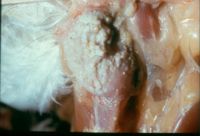Candidiasis - Birds
Also known as: Thrush — Sour Crop — Crop Mycosis
Introduction
Candidiasis is a fungal infection caused by Candida spp., most commonly Candida ablicans that affects many species (see Candidiasis).
Signalment
Candidiasis is common in neonatal psittacine birds. It occurs primarily as a result of immunosuppression and trauma to the ingluvies. Hypothermia, feeding too cold or too hot formula which results in crop-burn, poor nutrition, longterm antibiotic therapy, hypovitaminosis A and systemic illness from other causes are all predisposing causes.
Clinical Signs
The bird may present with inflammation and delayed emptying of the ingluvies. On examination of the crop surrounding structures, there are normally grey-white lesions and a whitish necrotic material present. There may also be thickening of the crop wall.
Diagnosis
Diagnosis is based on identification of oval yeasts and hyphae on cytological smears taken from swabs and crop washes or aspirates. Wrights stain can be used to demonstrate the yeasts. There should be no evidence of an inflammatory response. The presence of hyphae indicates that the crop may have been penetrated and the infection has spread systemically.
Treatment
An antifungal drug is indicated for the treatment of candidiasis. The presence of hyphae is suggestive of invasion of the mucosa by the yeast and the potential for a systemic infection. Therefore, a systemic antifungal such as oral itraconazole (for 7 days) is recommended along with a topical antifungal such as nystatin BID or TID for 7–10 days.
Prognosis
The presence of hyphae on cytological examination suggests a severe infection and potential systemic spread, and therefore a poor prognosis. Without evidence of hyphae the prognosis is improved.
| Candidiasis - Birds Learning Resources | |
|---|---|
 Test your knowledge using flashcard type questions |
Avian Medicine Q&A 16 |
References
Forbes NA & Altman RB (1998) Self-Assessment Colour Review Avian Medicine Manson Publishing Ltd
Girling, S (2004) Diseases of the digestive tract of psittacine birds In Practice 2004 26: 146-15
Merck & Co (2009) The Merck Veterinary Manual (Ninth Edition), Merial
| This article has been peer reviewed but is awaiting expert review. If you would like to help with this, please see more information about expert reviewing. |
Error in widget FBRecommend: unable to write file /var/www/wikivet.net/extensions/Widgets/compiled_templates/wrt69a602d7b3a1b6_33358406 Error in widget google+: unable to write file /var/www/wikivet.net/extensions/Widgets/compiled_templates/wrt69a602d7b8d4e6_81435859 Error in widget TwitterTweet: unable to write file /var/www/wikivet.net/extensions/Widgets/compiled_templates/wrt69a602d7bec9d7_81621068
|
| WikiVet® Introduction - Help WikiVet - Report a Problem |
